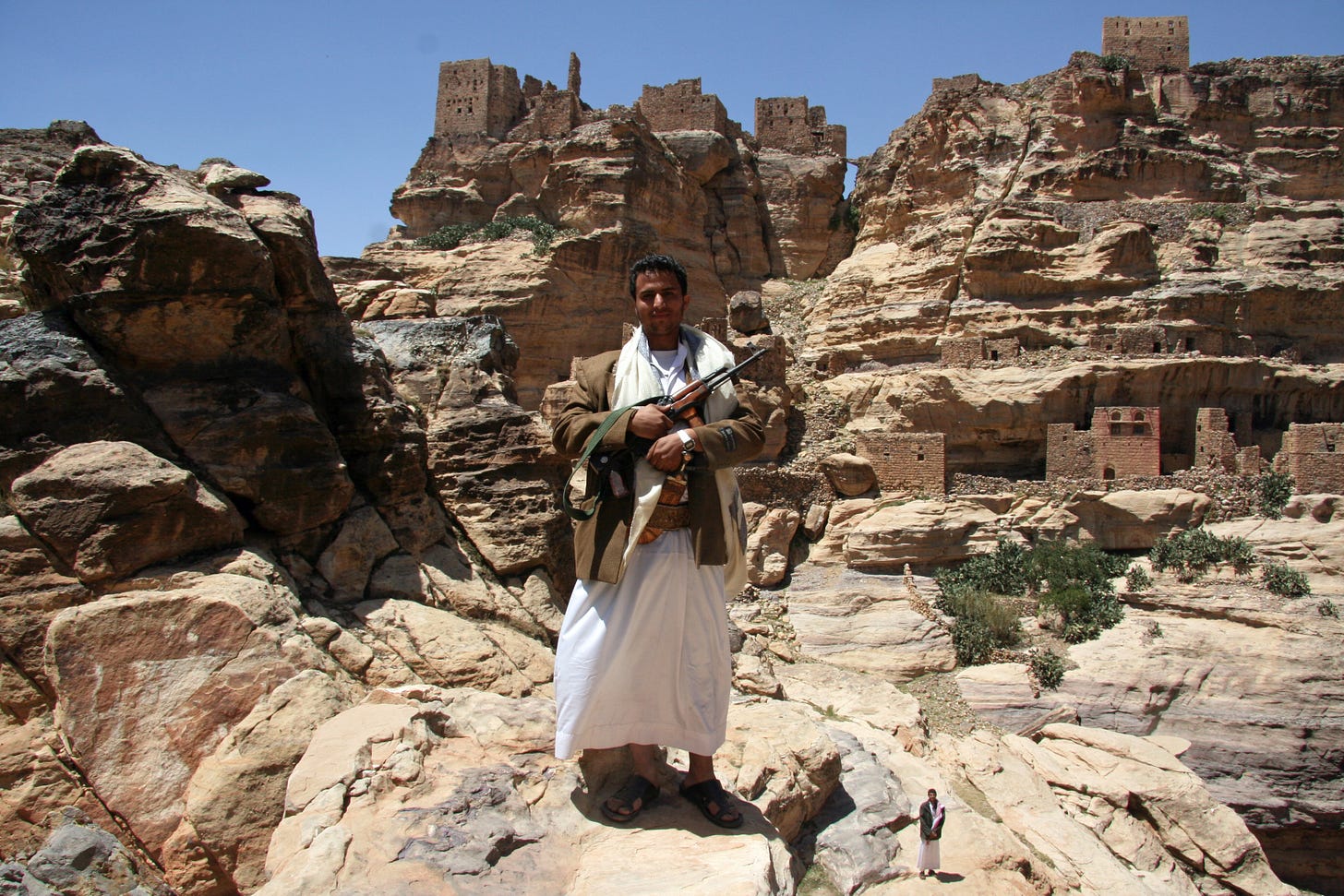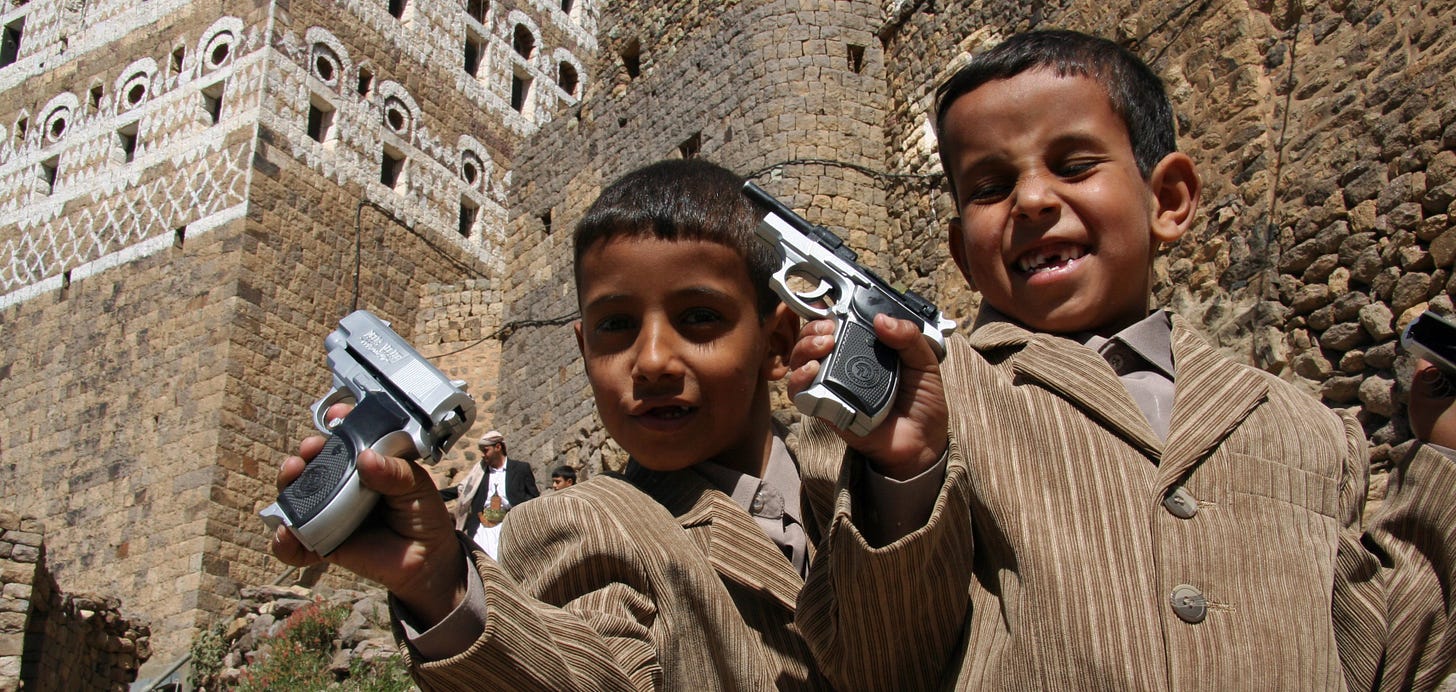War Starts
22nd May 1990. The two Yemens, north and south, become one. The mood of the world seems to be for the dissolution of old animosities. In that same week, East and West Germany sign a treaty to begin reunification, the US and USSR agree to destroy their chemical weapons, and the World Health Organisation stops describing homosexuality as a disease. The love and fraternity do not end there. During the following year, 16 nations hold their first democratic elections in at least three decades, some like Mongolia and Russia, for the first time ever. The celebrated optimist, Professor Francis Fukuyama, has already declared the victory of capitalism, but now he goes further, proposing that a universal acceptance of Western liberal democracy will herald the end of history and human social evolution. Once that fact sinks in, the Democratic Peace Theory is rolled out. First mooted by Immanuel Kant in 1795, it predicts that democracies will never go to war with each other. The inevitable conclusion is that war is about to become extinct.
2007. Fukuyama modifies his argument somewhat, saying that he never meant that totalitarianism could not have a resurgence, only that was doomed in the long term. Arms dealers sigh with relief. War is reprieved.
2017. American political theorist Graham Allison publishes Destined for War in which he refers to Thucydides's argument that the rising power of Athens caused fear in the established power of Sparta and made the outbreak of war in 431BC inevitable. Allison applies this historical lesson to China and the United States.
November 2021. China tests a hypersonic missile. Russia, the United States, North Korea and a joint Anglo-French project are also thought to be developing similar projectiles that can travel at speeds in excess of Mach 5. China is also alleged to have launched a hypersonic glide vehicle from their missile, a technological feat that no other country is close to achieving.
In 1994 I am living in Yemen, a country that is stumbling towards war with itself.
The road east out of the Yemeni capital Sana'a curls up into the mountains and comes to an area where great flat-topped bergs of desert rock are interspersed with dry valleys. In places are mud-walled villages with small irrigated fields of peaches and vines. Stone watchtowers are dotted around.
One day in 1994 we were driving along this road. Every man we passed had a Kalashnikov slung over his shoulder. Barefoot small boys shouted at our car, stalactites of snot hanging from their noses. The girls clustered in the shade, talking. Dust devils flickered into life and shimmied across the landscape.
We were not planning to reach Marib, 100 miles east, a town beyond the mountains and once home to the Queen of Sheba. Everyone knew that the road became too dangerous once you began the spectacular descent to the desert. This was intended to be a safe excursion. Sitting on the bench front seat next to me were Caitlin (4), Conor (2) and my ex-wife Judith. What we were hoping for was a viewpoint, a picnic, and a little bit of exploration. The place I had in mind was the tomb of the prophet Job. It was supposed to be up here: a weathered shrine on a hill to a man who endured all the trials and tribulations that Satan could throw at him, but never once hesitated in his devotion to God. For the religious, he's the stoic symbol of endless faith in the face of calamity; for the unbeliever, a hopeless bonehead who won't change, not even when everything goes wrong.
In the previous few months Sana'a had become claustrophobic. Everyone was expecting war to break out between the armies of the north and south. When Yemen united its mountainous Islamic tribal north with its mountainous Islamic tribal south, many observers were adamant that the experiment was doomed to fail. The differences between the two sides were too great. By early 1994 the prophecies appeared to be coming true. Southern politicians had retreated to Aden. Outbreaks of fighting were reported. Prices began rising. Everywhere there were guns. Anyone who owned a Kalashnikov dug it out and started wearing it.
From the road I spotted Jebel Marmar, a mountain topped by an astonishingly well-preserved ancient city that I'd climbed up to once before. Job's Tomb, I'd been told, was nearby. We passed abandoned alabaster mines, their gaping mouths flecked with white, and on a distant ridge saw a dome. Maybe that was it.
I suppose we were doing around 80 kph when it started: a popping noise, apparently coming from below. I stuck my head out the open window and listened. At the same time I let the car slow down. Maybe we had a puncture? But now the pops became more frequent and urgent, and were overhead. I suddenly thought: 'Is someone shooting at us?' I accelerated hard over a low hill and descended. The pops had stopped and there was a sun shelter by the road where some men were squatting by a large pile of onions. I pulled up beyond them and checked the tyres. No problem. I walked over to the men who greeted me warily. They were wearing the uniform of Yemeni farmers: tattered black sports jackets over a white tunic tied at the waist with a belt. They squatted with ease, elbows on knees, the benefit of a lifetime without furniture, their Kalashnikovs within easy reach.
"Is that dome on the horizon the tomb of Ayyub?" I asked, referring to Job by his Arabic name.
"It is."
"Is there a path?"
The men started laughing. "You cannot go there!"
"Why?"
"You will die."
At that moment two things happened: a Landcruiser went flying past at high speed with a white flag tied to its aerial. I caught a glimpse of the driver's face: hunched over the wheel and frightened. And at the same time a boy ran out from behind the onions and stood in front of me. "Hey You! Give me pen."
One of the farmers told the boy to go away.
I asked: "Why will we die?"
The farmer made a face. "There's a war."
"A war! Between who?"
The farmer pondered this for a while, then gave his opinion. "It’s between Here and There."
I started laughing, it sounded so absurd. But he didn't like that. "Go back," he told me sternly, "There is war and you will die."
When I got back to the car, the boy was there. “Pen?”
I jumped in the car and tried to persuade Caitlin to donate a crayon to the boy. She refused. I told him: “God will give you one.”
Judith and I decided to drive on. There was a village up the road where we might get some information. If the popping had been shooting, I reasoned, it was not a good idea to go back - not yet.
However, soon after we set off again, the popping sounds restarted. I accelerated hard. At the side of the road I saw a woman sprinting for cover, then up ahead two men running with automatic rifles, each of them laden with bandoliers of spare rounds. They leapt down a bank and waved at me to halt, but then, as we approached they saw our foreign faces and shouted. "Drive! Go!" In the rearview mirror I saw them crouch, then the shudder of their shoulders as they unleashed a volley across the valley. My foot was flat on the floor, the engine screaming. I didn't hear the shots at all, not until I remembered to change gear. The pops, I realised, were the snap of bullets passing overhead, but where from? I bundled Conor and Caitlin into the footwell, but then the car abruptly slewed to the right. One of the tyres had burst. I managed to hold us on the road and we rolled into the village, pulling up outside a tea shop.
In the midst of a crisis there are two types of responses: some people accept the new situation with alacrity and take action, others however, pretend it isn't happening. Both reactions have their advantages and the same person might flip between the two in different circumstances, but the steadfast refusal to react is common. It's actually magical thinking: if I behave like things are normal, then maybe normality can be saved. During war this strategy can go badly awry.
In the village men were running with guns in hand and women were herding children indoors. But there were also men sitting in the tea shop, sipping their morning cuppa with all the sang froid of magical thinkers. The prophet Job, I suspect, would have been with them.
I started changing the wheel and a passerby came to help, telling me there was a tyre repair shop a few hundred metres out the village on the far side. That sounded like a good idea as I didn’t want to drive back to Sana’a without a spare.
"How long has this war been going on?" I asked him. "And when will it end?"
He frowned. "It'll end at three o'clock - for a few hours at least."
I should have thought of that. For the average Yemeni man, the day is interrupted by prayer and qat-chewing. After midday prayers comes lunch and then a search for a nice shady place to sit down and chew a few qat leaves with friends. By three o'clock the streets are quiet. All we had to do was wait for the drug-induced ceasefire to kick in.
I drove out to the tyre place on the outskirts. There was a hut built from ash blocks with a tin roof, a pile of old tyres, a compressor and two boys looking after business. Despite their tough, wind-chapped faces I guessed they were about ten years old. They were wearing adult overalls, sleeves and legs rolled up. They examined my wrecked tyre with expert fingers, then removed the shredded inner tube.
"Did a bullet do that?" I asked.
They shrugged. They were ice-cool, determined to play their role as mechanics. If they kept up the pretence, they knew I would accept it as true. They were magical thinkers. I went to school with a lad who performed the same trick, pretending to be a rock star until everyone accepted that he would, one day, become a rock star. The only problem was he didn’t play an instrument, or sing, or write music, or have a band. He looked good though.
"There's a war on," I persisted. "Just up the road"
The boys did not deign to respond, throwing my tyre on one pile and selecting a replacement from another. Nothing was new in this place: there was only worn, or worn out.
"Lots of fighting," I went on, determined to get some kind of reaction. "Aren't you worried?"
Finally one of the boys looked up. "Who is fighting?"
I grinned, remembering the farmer. "Here and There."
“Oh them,” sighed the boy, wearily summoning up all the jaded disdain that a ten-year-old can muster. "They're always fighting."
By two o’clock the crackle of small arms fire became sporadic and by three it was finished. We drove back to Sana’a without incident.






This was thought provoking on many levels and incredibly relevant. I'm excited to read your other posts. Thanks Kevin.